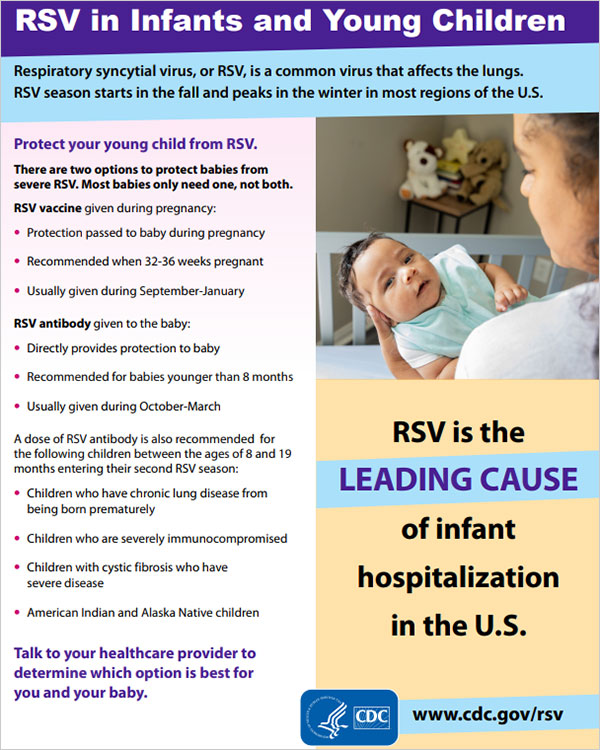
What is RSV?:
RSV or Respiratory Syncytial Virus is a common virus that for healthy adults and older children can appear like the common cold. However, in young children (and even the elderly) it can lead to lower lung involvement called bronchiolitis that can lead to hospitalization and sometimes even death.
How does RSV spread?:
RSV spreads through respiratory droplets and direct contact so touching surfaces contaminated with the virus, coughing or sneezing, and kissing or sharing utensils or cups with someone with the virus.
Who is most at risk?:
A common misconception is that babies are the only ones that get RSV, but in actuality EVERYONE can get RSV and subsequently can transmit it to those more vulnerable or at risk for bronchiolitis. This includes infants and children under two, premature babies born before 37 weeks gestation, and children with chronic conditions like lung or heart conditions.
What are the symptoms of RSV?:
In mild to moderate cases, RSV can cause runny noses, decrease in appetite, coughing, sneezing, and fever. In severe cases, it can lead to a condition called bronchiolitis. Bronchiolitis can be caused by many viruses, but RSV is one of the most common ones. The symptoms of bronchiolitis include:
Difficulty breathing: noticeable labored breathing with lungs tugging in and out or nasal flaring known as retractions
Wheezing or rhonchi: a noisy sound in the chest that can often be described as a washing machine sound which is more audible with a stethoscope
Dehydration and extreme irritability or inconsolable.
The symptoms of bronchiolitis—if they happen-will occur 3 days after onset of the nasal congestion.
What is the risk of RSV in terms of hospitalization?
The average annual hospitalization rate for RSV in children under 5 years old is 4.0 per 1,000 children. The hospitalization rate is highest for children 0 to 2 months old, at 23.8 per 1,000.
Two to three out of every 100 infants with RSV may need to be hospitalized. They may need oxygen or IV fluids if they aren't eating or drinking.
When should you bring your child in to be evaluated?
Because mild symptoms can resemble a common cold, it's always best to monitor symptoms. If your child has any of the following bring them in or call our nursing line for guidance:
- Difficulty breathing
- Dehydration-not making urine diapers or urinating and not drinking formula or breastmilk
- High persistent fever for more than 3 days or fever at any point with irritability or inability to be consoled
What is the treatment for RSV?
There is no medicine that will cure RSV as it’s a virus with no treatment, but care is supportive. This may mean nasal suctioning, hydration, and in severe cases hospitalization for IV fluids and/or oxygen or respiratory support.
RSV can be particularly concerning for infants and young children, especially those with underlying health conditions, so timely medical evaluation is crucial for managing the virus effectively.
This blog was written by Pediatric Associates' Dr. Mona Amin Fort Lauderdale South.